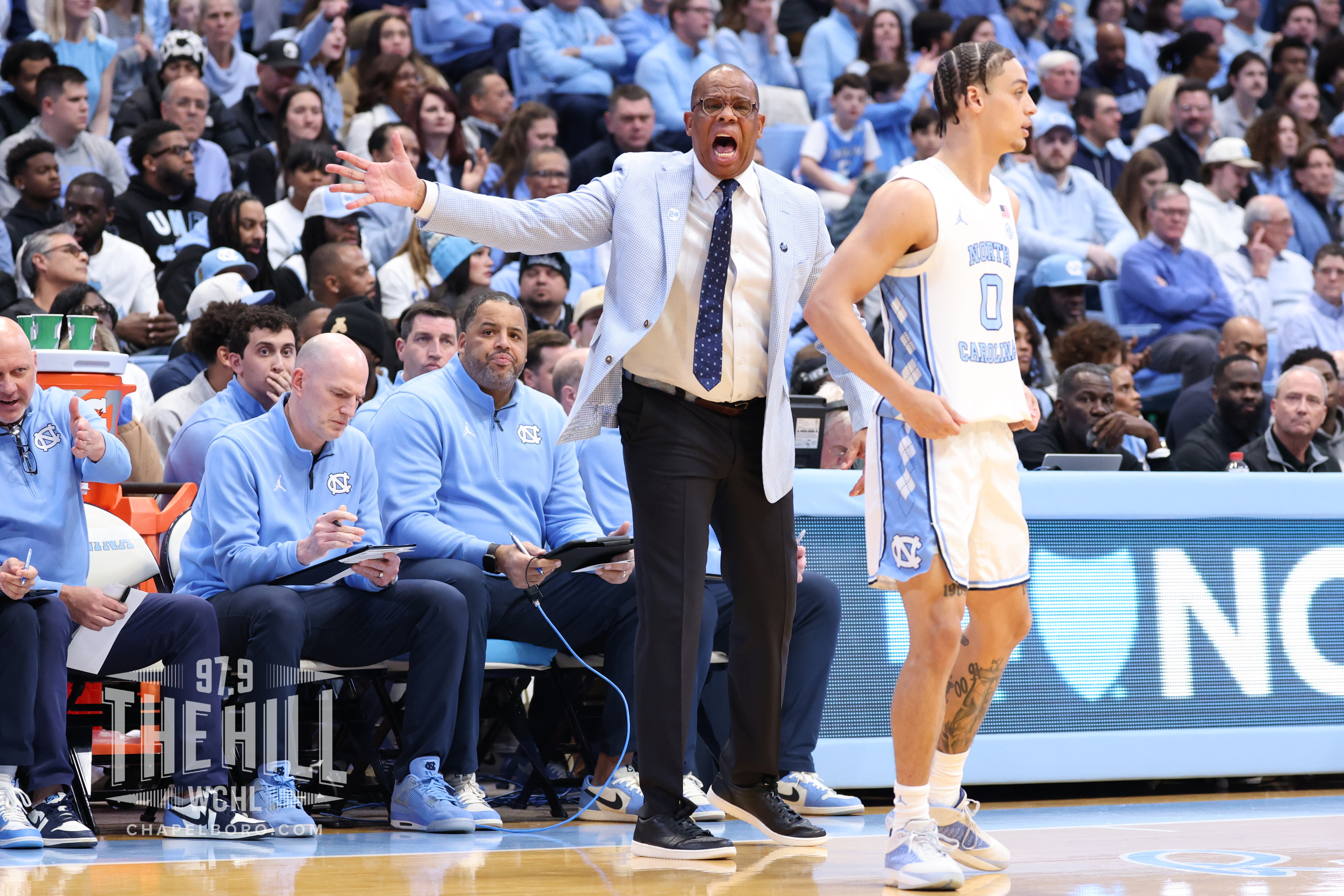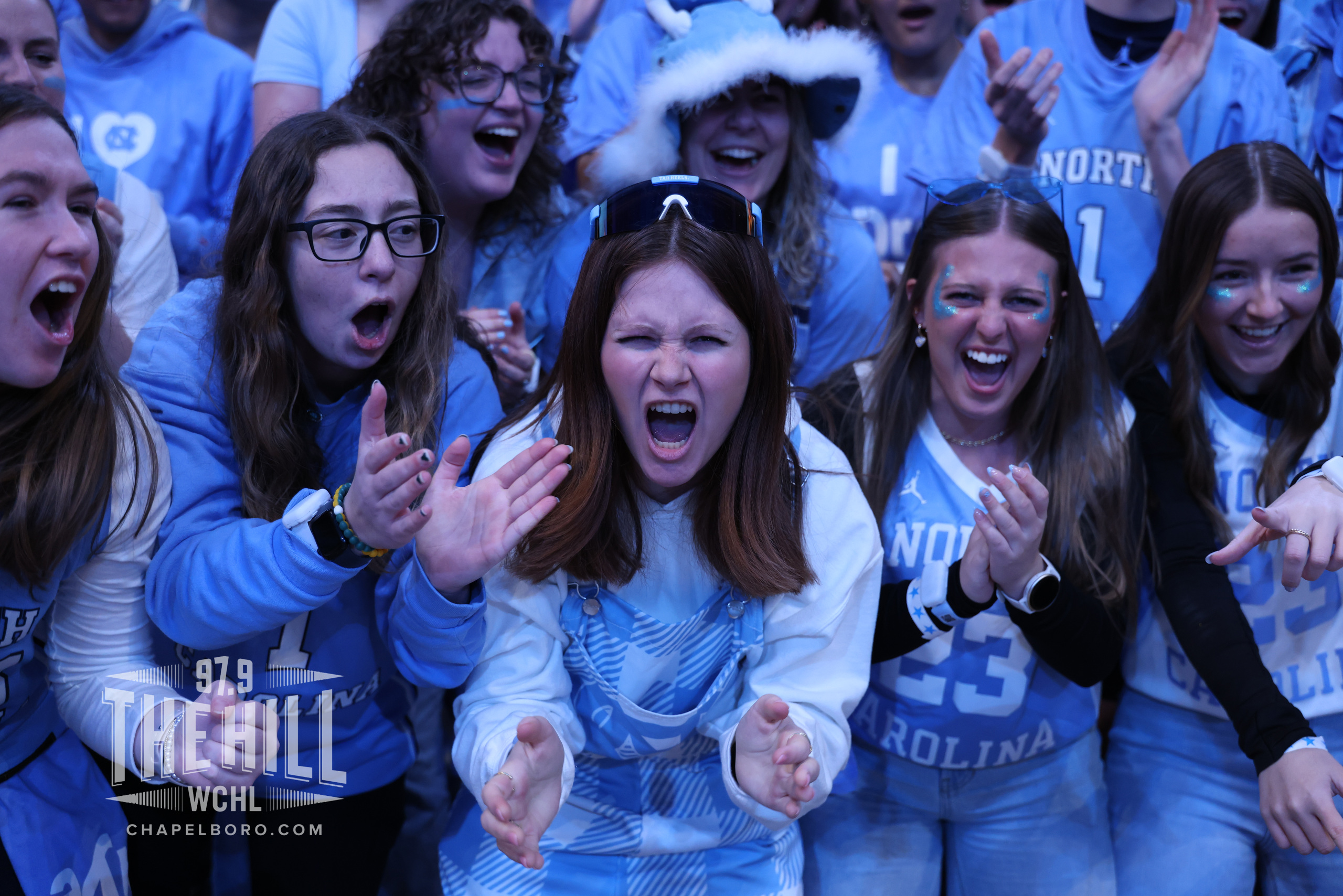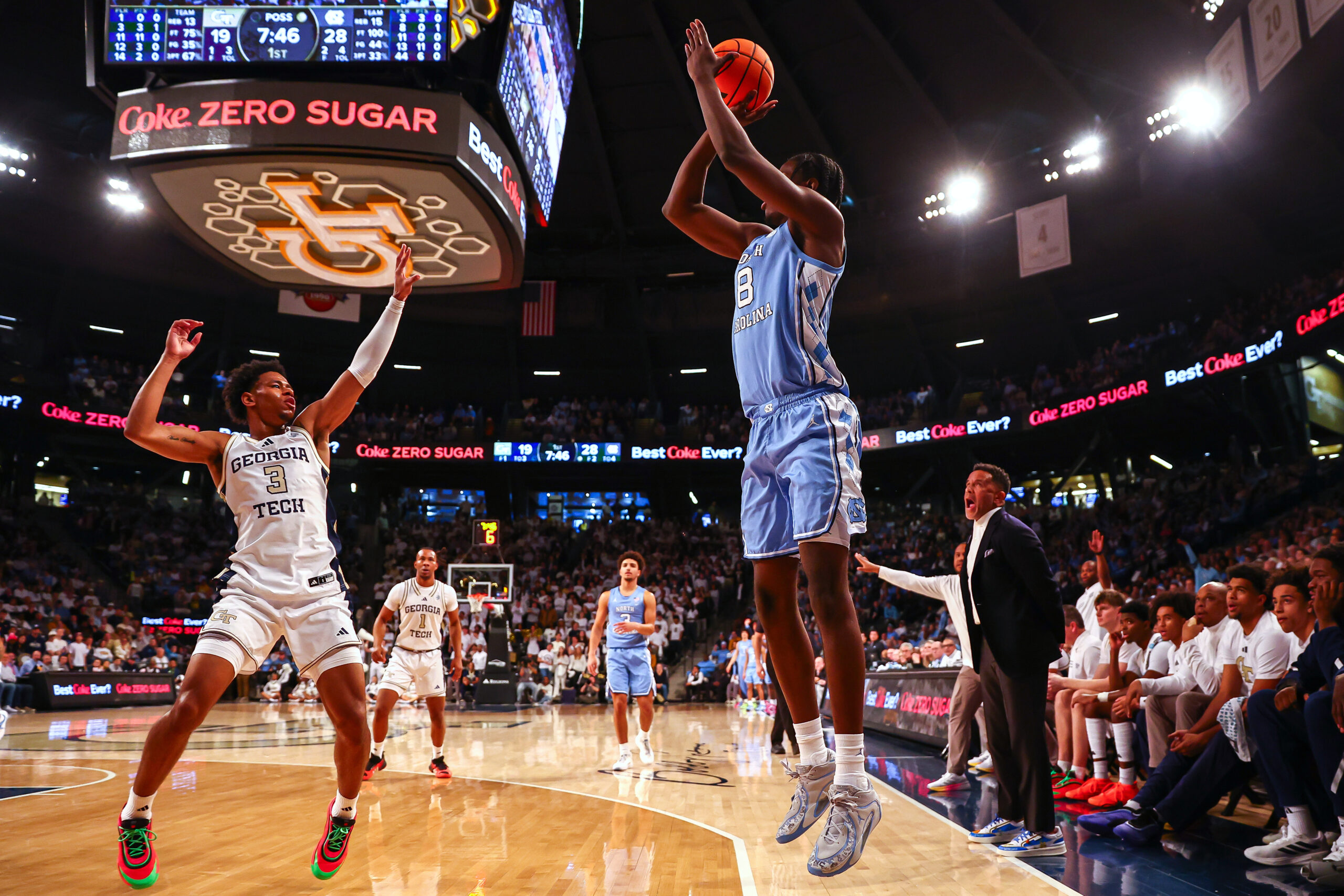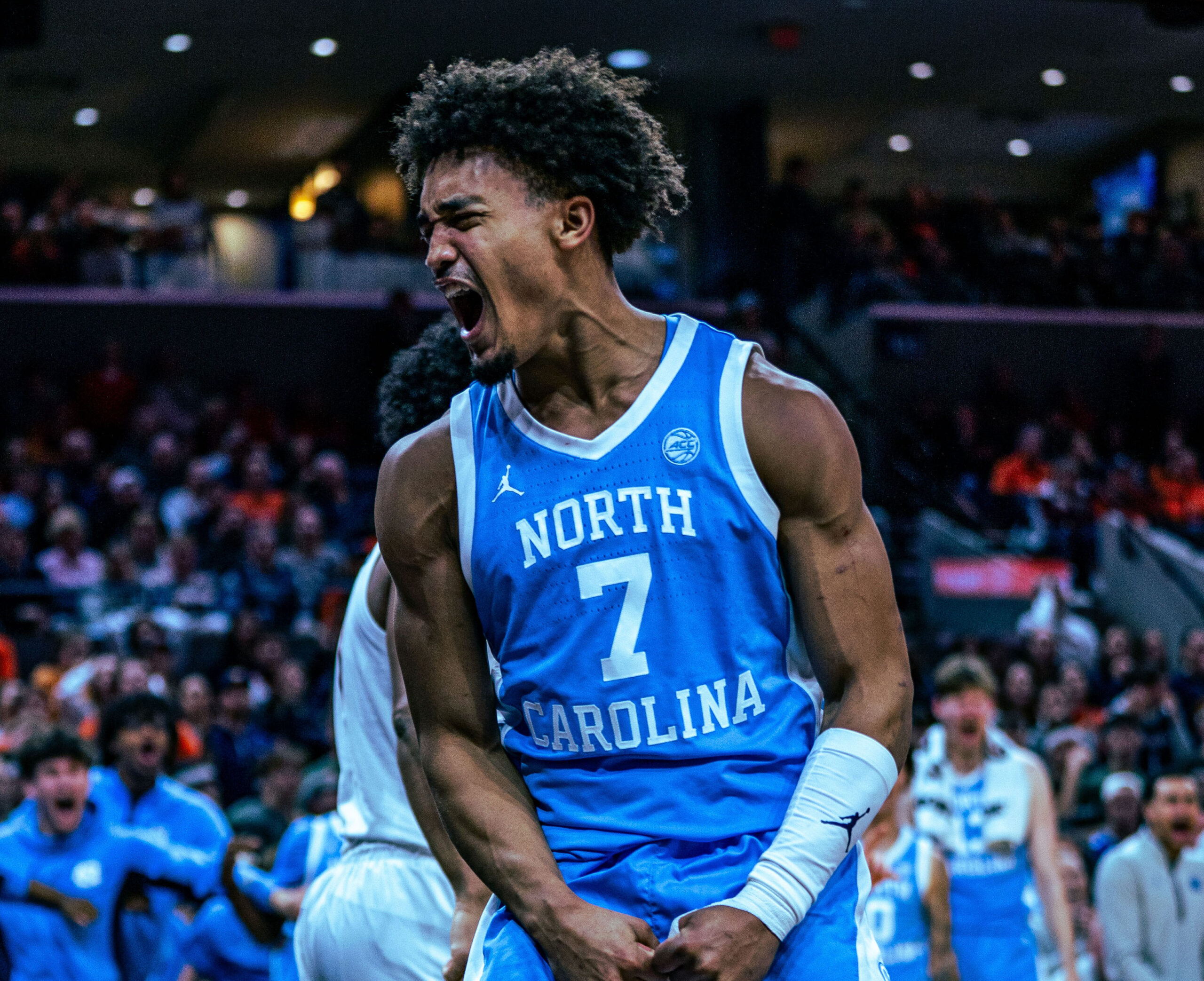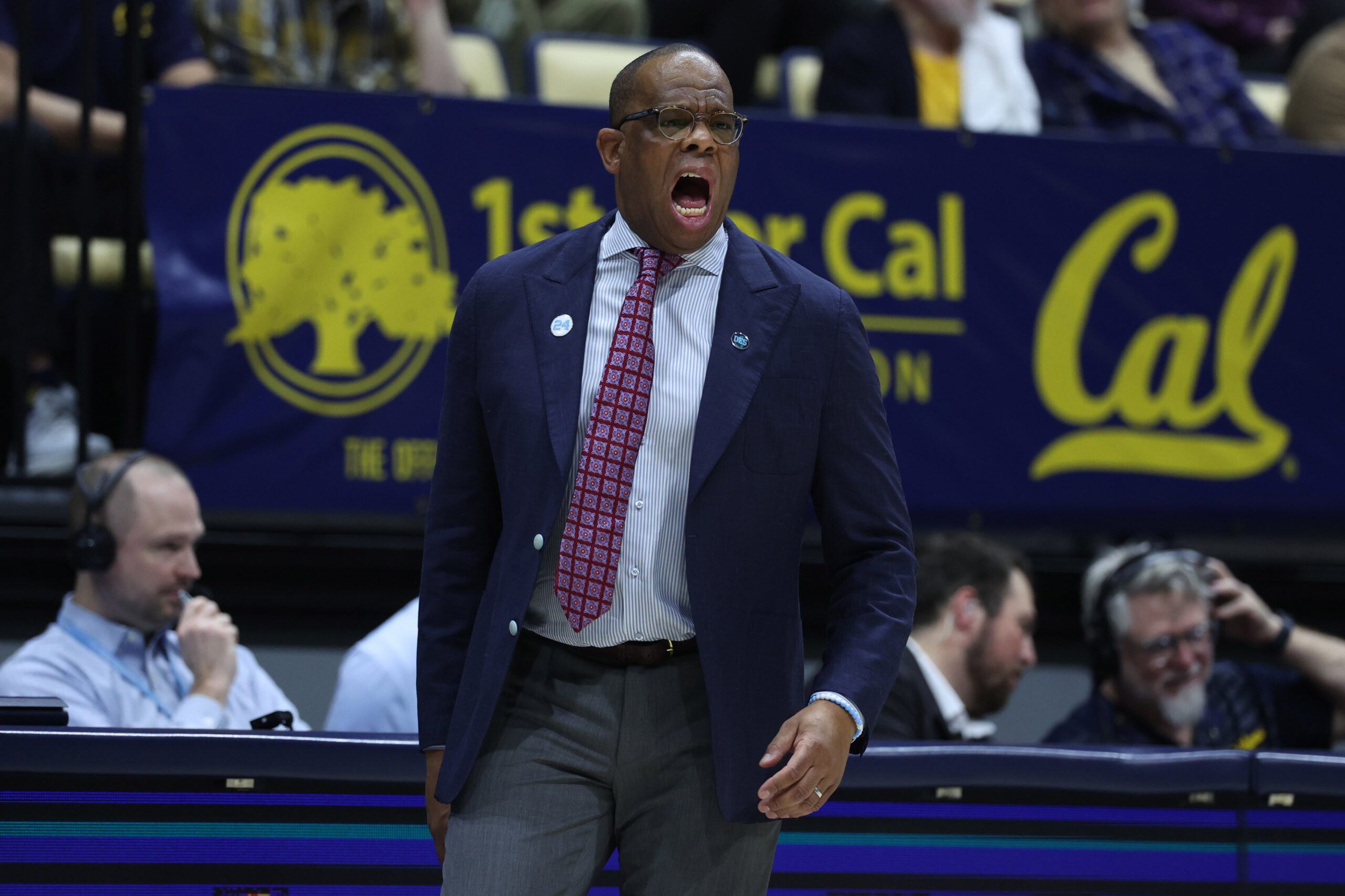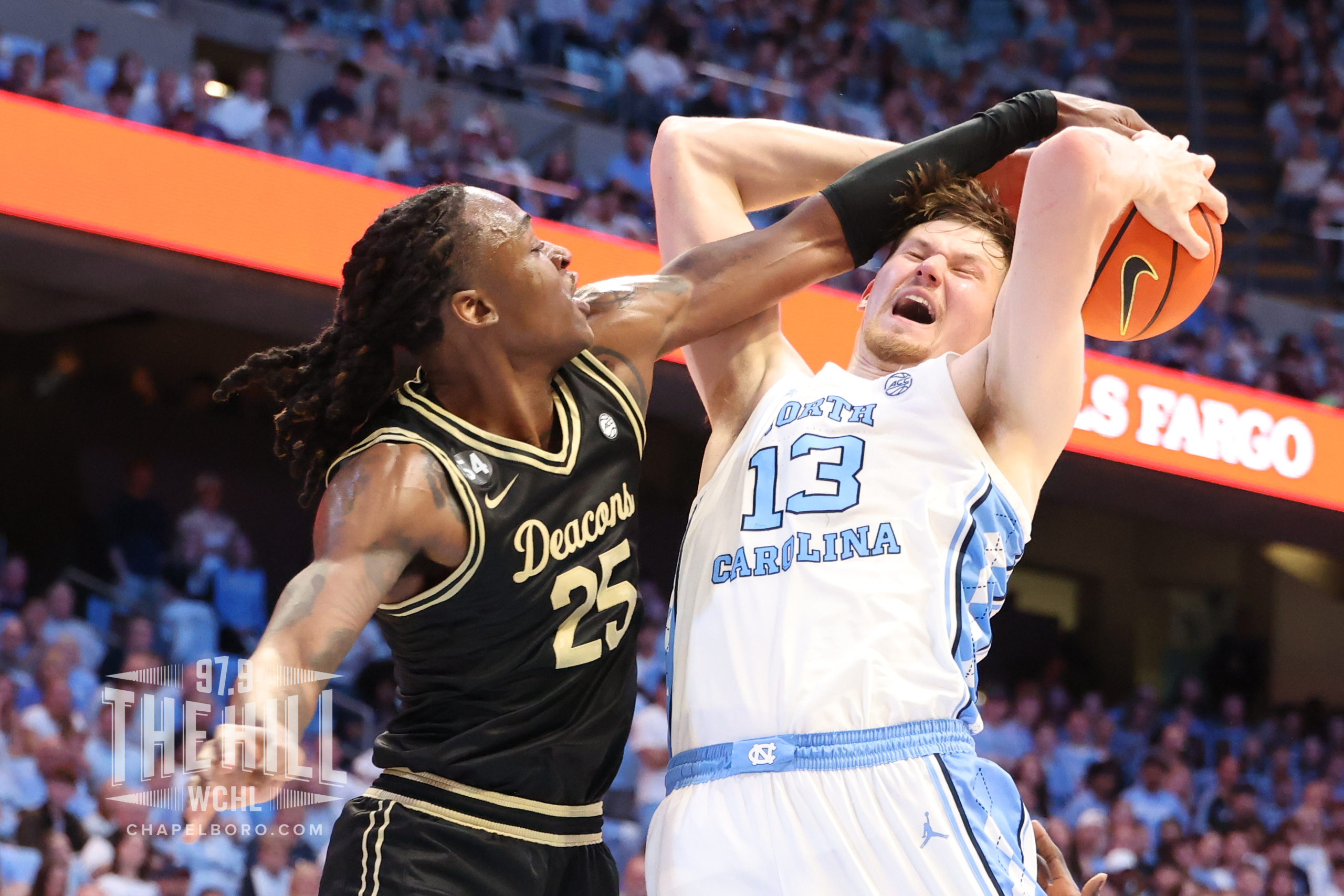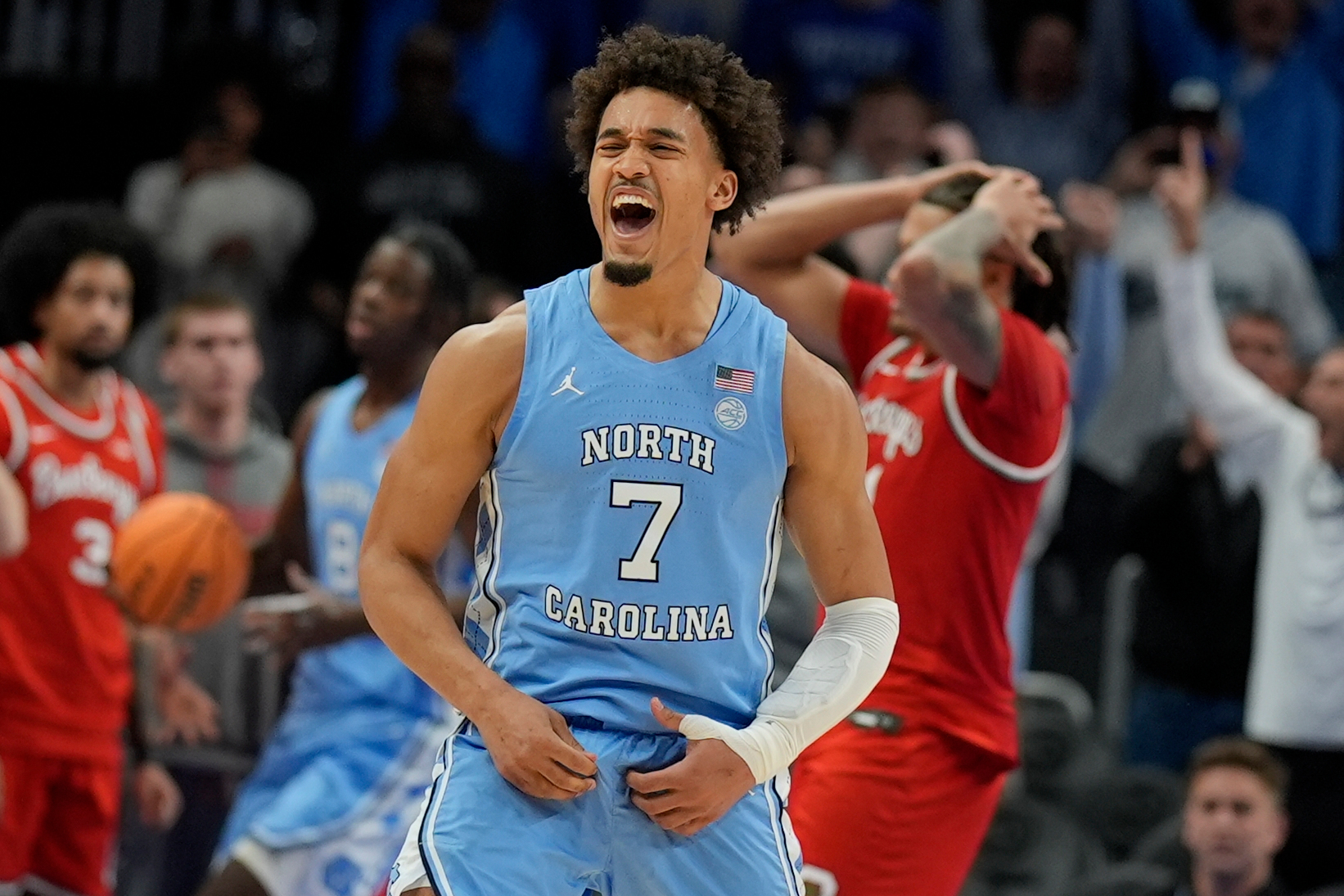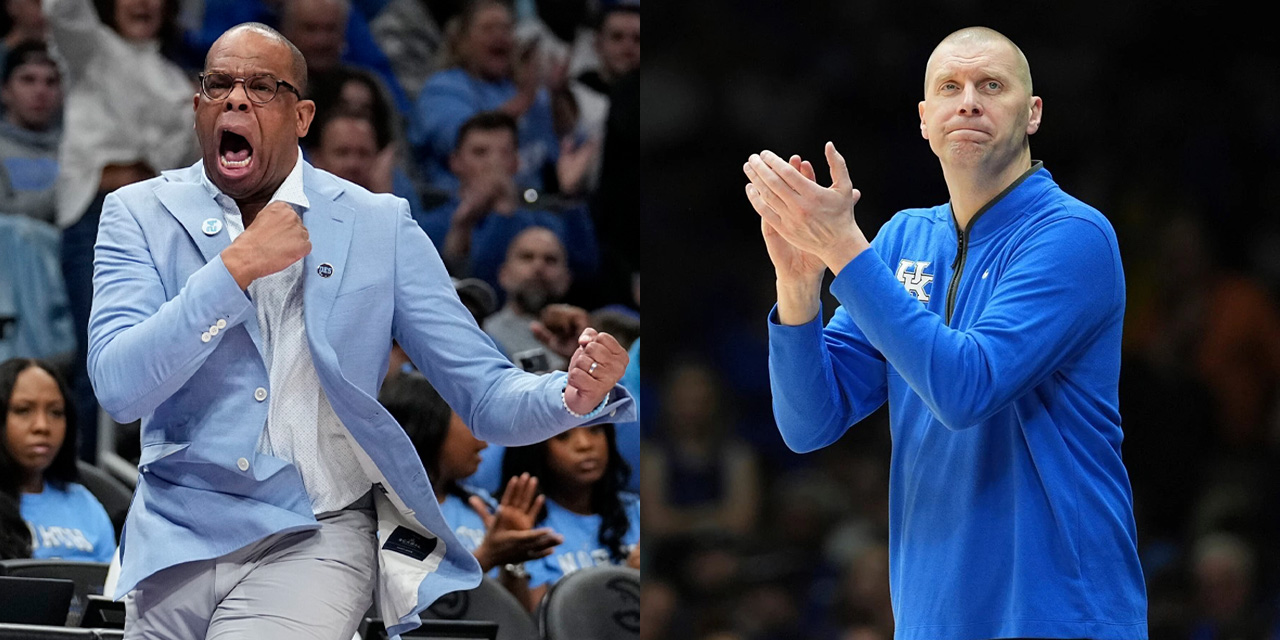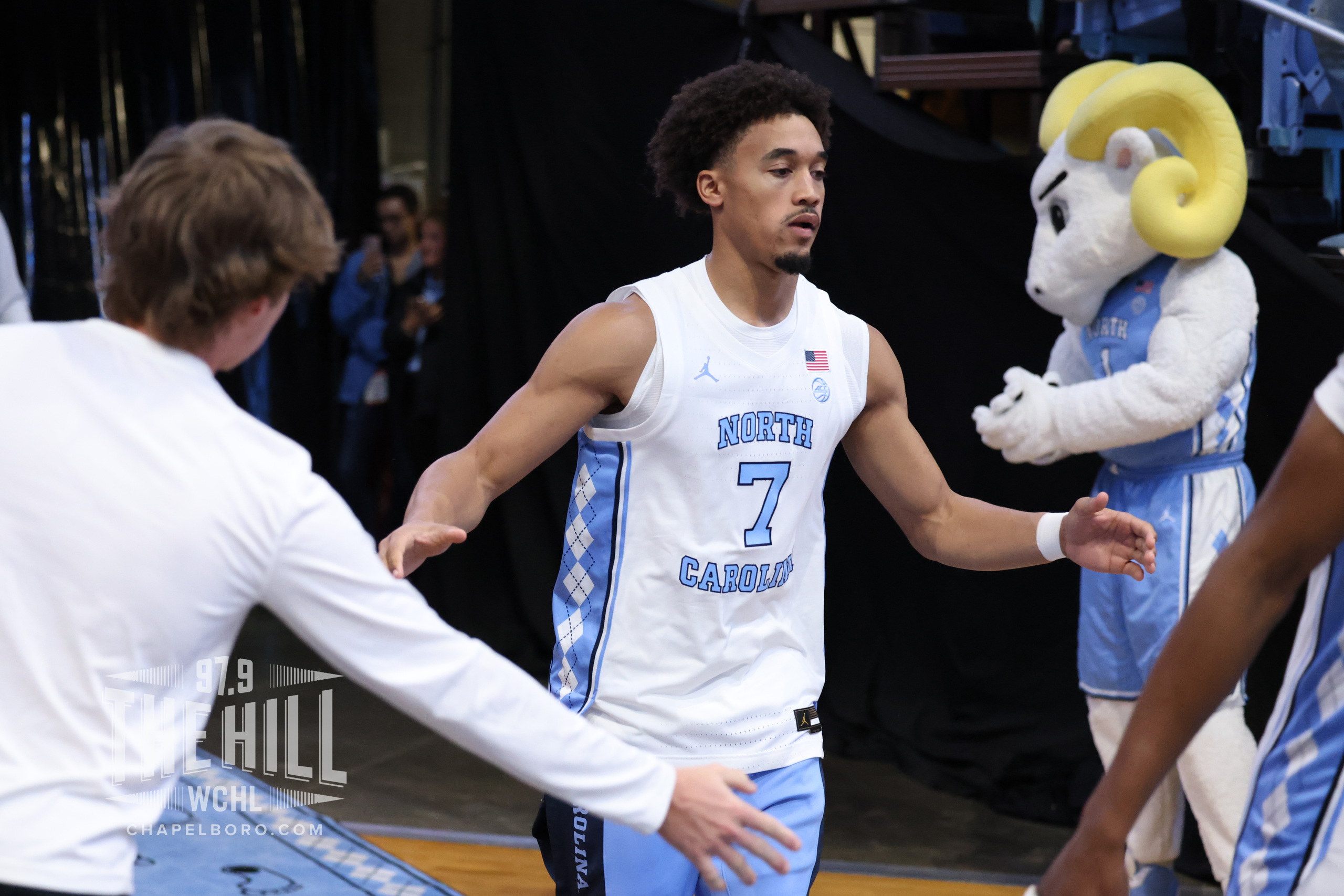The game of basketball is all about what the players do on the hardwood — but what help dictates that action is the game clock. These days, stoppages are basically synchronized with the clock to waste as little time as possible and allow the full game to be played.
The invention that helped start the practice in the 1990s is rooted in North Carolina and got started, in part, thanks to connections along Tobacco Road.
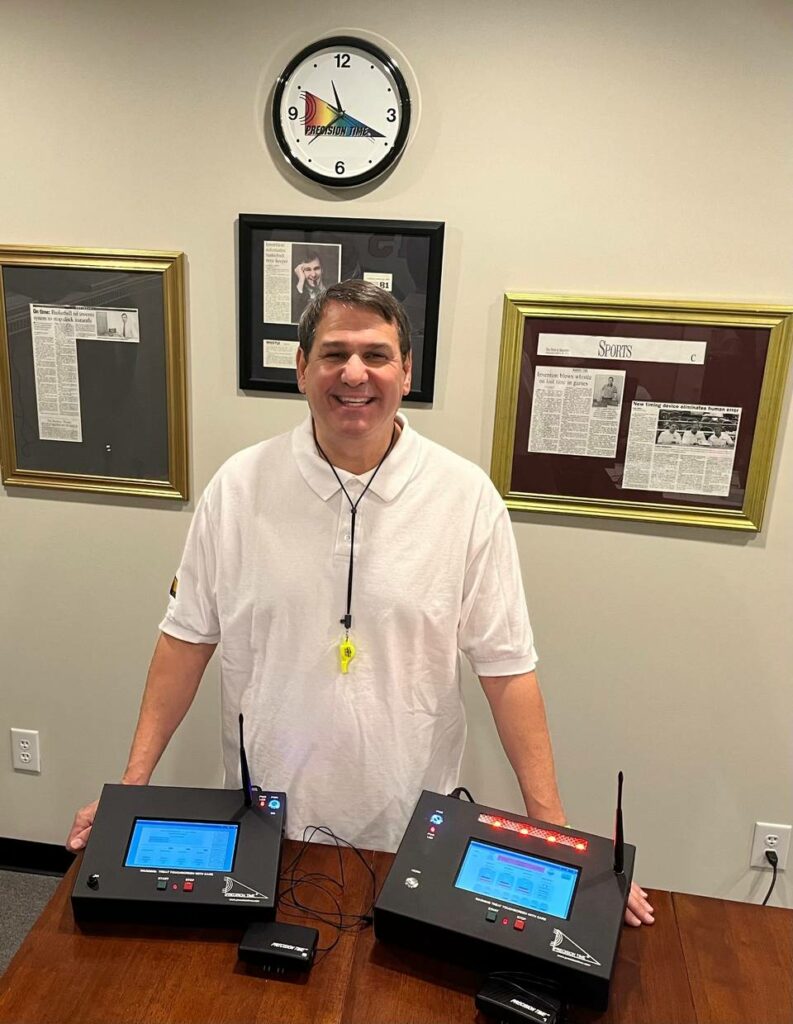
Mike Costabile stands with his Precision Time setup in 2021. He holds the patent to the technology that helps referees stop game clocks almost instantaneously. (Photo courtesy of Mike Costabile.)
Mike Costabile grew up off Pope Road and Ephesus Church Road in Chapel Hill and was raised around the culture of business. His parents owned the popular Mario’s Italian restaurant for decades and, for a while, Mike ran an optometric practice with his brother in town.
He was also raised around the culture of basketball – and, specifically, refereeing.
Mike’s father, John, worked as a referee in New York from when he was a teenager into adulthood, and his oldest son – also named John – eventually refereed high school and college ball. Mike was roped into the profession in his early 20s and cut his teeth at the high school level before reffing for some ACC, Big South, and Division II college games. Costabile jumped to the NBA in 1989, making refereeing professional basketball a full-time job.
A game during his second NBA season is seared into his mind, with a key moment that helped launch Costabile’s signature invention. In a one-point overtime game between the Milwaukee Bucks and Philadelphia 76ers, he made a call that would ultimately lead to Philadelphia snatching a win from the jaws of defeat.
“I called a foul on [Milwaukee’s] Jack Sickma at the end of the game and I felt my whistle was before the horn,” Costabile says. “So, I put Charles Barkley on the line for two free throws. Barkley gets up there, no time on the clock…makes both free throws, Philly wins the game.
“So,” he continues, “as things went on, I said, ‘I’m going to come back and develop something so that we have a little more control over the game clock where we can start it as well as the whistle stops it, instead of waiting for a person to react.’”
During his final season as a ref in 1993, Costabile began putting together the first Precision Time System. The setup includes a microphone on a referee’s lanyard calibrated to read their whistle when it’s blown, which Costabile describes as like “a digital fingerprint.” When a ref blows a whistle for a call, it communicates with a belt pack worn by that referee and sends a signal to stop the clock at the scorer’s table.
While Precision Time has upgraded its equipment to gather data and further improve communication, Costabile says he remembers the first opportunity to try out the system during a game, when he was pitching the technology to potential buyers. The refs put on the equipment, calibrated their whistles, and two game clocks kept track of the difference in reaction time vs. Precision Time.
“Over the course of every whistle, there’s six to eight tenths of a second of reaction time from the timekeeper to flipping the switch,” says Costabile. “We took that out of the game – because there’s 60 to 80 whistles in a game. When we were done in this first game, we had one minute and 28 seconds on our clock, and their clock was at 0:00.”
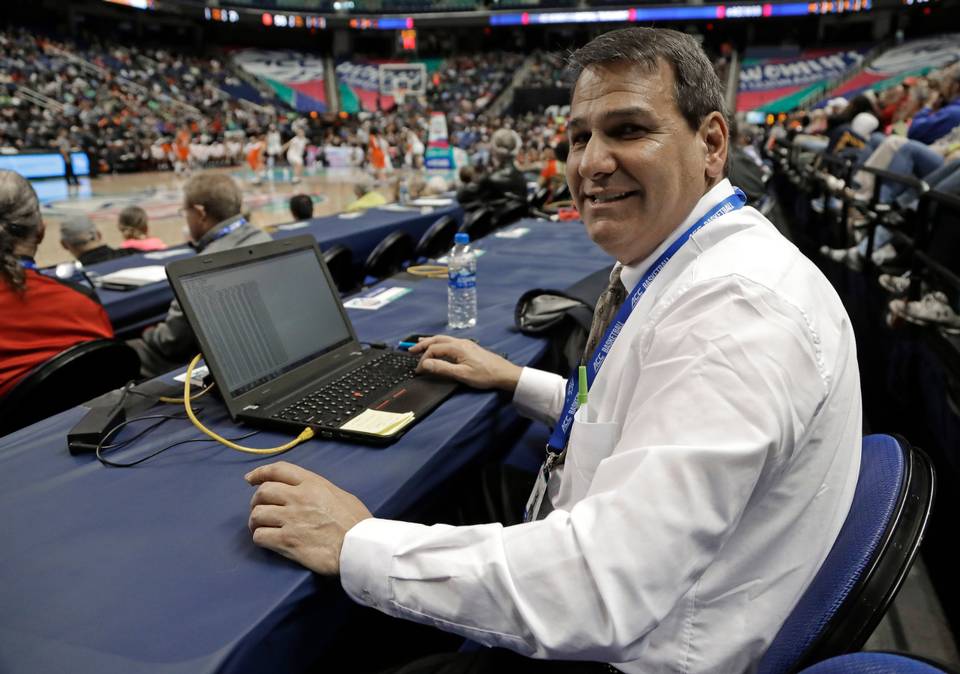
In this photo taken March 9, 2019 Precision Time inventor Mike Costabile, a former referee, poses for a photo as he keeps track of a log of the system during the second half of an Atlantic Coast Conference women’s tournament basketball game in Greensboro, N.C. (Photo via AP Photo/Chuck Burton)
Since then, Precision Time has spread across all levels of the sport with Costabile as it founder and CEO. The company struck a deal with the NBA and its affiliates, and the system has been used to help referee the NCAA Tournament, Olympic games, and world championships. It’s in a dozen European leagues as well. Spain, France, Italy, Russia, Turkey – Costabile rattles them all off.
But he credits North Carolina and its basketball circles for helping lay the groundwork for that initial expansion. He said the use of Precision Time technology in a NCHSAA tournament in 1995 was an early, successful test of the system – and he turned to UNC basketball connections to help put in good words about his company at the collegiate and pro levels.
“Coach [Dean] Smith, Donnie Walsh, Coach [Larry] Brown, Coach George Karl,” Costabile recalls. “I could go on and on naming names of everybody that was very, very helpful in getting Precision Time in the NBA and college basketball.”
The North Carolina influence on the technology doesn’t stop there. Precision Time Systems is based out of the coastal town of Supply, where Costabile lives. He also used an attorney formerly based in Chapel Hill to earn his patent on the invention – which Costabile says was fast-tracked in 1994 because the officers had never seen anything like it.
There have since, however, been imitators and competitors – some of which Costabile contends infringed on that patent.
In 2021, Precision Time Systems filed a lawsuit against the Raleigh-based company UStopIt LLC and its own system called WhistleStop. Costabile maintained that veteran college basketball referees Keith Fogleman (WhistleStop’s inventor) and Roger Ayers (a key investor, who shot a video promoting the system) illegally used his intellectual property to create their technology. UStopIt denied those claims – but the lawsuit was settled out of court in September and resulted in UStopIt receiving a non-exclusive license to use Precision Time’s patent.
Costabile describes the process as frustrating and as a learning experience of needing to protect your ideas – also pointing to the lack of oversight in collegiate refereeing as a contributing factor. But he says that UStopIt’s attempt to end his patent allowed Precision Time made allowed his company to add more claims to its licensing structure.
“By this turning out it did,” Costabile says of the lawsuit, “[it] made the company stronger. It gave us a lot more credibility, a lot more strength [with competitors] knowing that… ‘If you go after these dudes, they’re going to fight back. They’re not going to lay down.’”
That intellectual property is also now changing hands – with Costabile’s blessing. At the start of 2024, he turned over control of the IP to Right Time Sports – a Durham-based company run by Steve Truckenbrod – to allow for the technology to expand further. Costabile and Precision Time will remain consultants, with the CEO saying they’re now working on products for baseball as the sport adjust to pitch clocks at different levels.
But he credits much of the start of his successful journey to growing up along Tobacco Road.
“If it wasn’t for the ties with North Carolina, as well as some of the ties with Duke, I don’t think this opportunity would’ve taken off,” Costabile says.
Chapelboro.com does not charge subscription fees, and you can directly support our efforts in local journalism here. Want more of what you see on Chapelboro? Let us bring free local news and community information to you by signing up for our biweekly newsletter.

